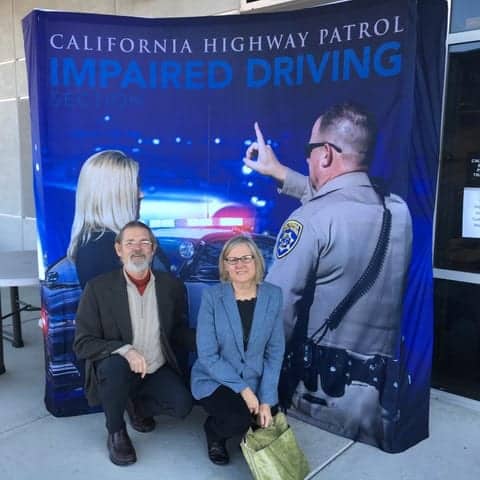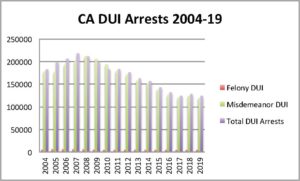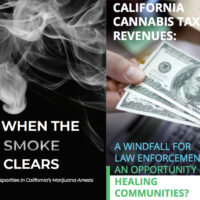
The California Highway Patrol has released its long-awaited report addressing drug-impaired driving, including driving under the influence of cannabis. The report contains numerous recommendations on improving DUI detection and prevention, data collection, public education, etc., but does not recommend adopting per se drug DUI thresholds like those used for alcohol.
The report is the work of the Impaired Driving Task Force (IDTF), in which California NORML and other interest groups participated, that was convened in the wake of the state’s 2016 law legalizing adult use of cannabis. The task force was charged under state law SB 94 (2017) with developing, “…recommendations for best practices, protocols, proposed legislation, and other policies that will address the issue of impaired driving, including driving under the influence of cannabis and controlled substances.”Cal NORML participated in the task force meetings throughout the three-year process. Deputy Director Ellen Komp sat on the Best Practices and Protocols subcommittee and Cal NORML director Dale Gieringer sat on the Technology, Research and Data committee, along with researchers from UCSD and others.
Cal NORML made sure the IDTF was informed of scientific evidence showing that driving impairment from cannabis cannot be determined through chemical drug tests like the alcohol breathalyzer. The report concluded: “A per se limit for drugs, other than ethanol, should not be enacted at this time as current scientific research does not support it.” However, it recommended continued research in this area, as well as in other methods of detecting drug impairment.
Dr. Thomas Marcotte of the California Center for Medicinal Cannabis Research presented the results of a driving simulator study, in which driving impairment was measured alongside blood and saliva tests for THC and a tablet-base performance test. The study found a “moderate” effect of THC on driving performance, with a broad performance range for THC-positive subjects that was sometimes indistinguishable from that of drug-free drivers.

Other recommendations from the task force address improved data collection, laboratory testing protocols, and increasing the number of Drug Recognition Experts (DREs) by four percent over the next five years. The report also recommends that, “Expanded training opportunities should be considered related to impaired driving for Criminal Justice Officers (judges, defense attorneys, and prosecutors) covering factors contributing to impairment and bias in arrest/prosecution” and that, “Law enforcement shall use Mobile Video/Audio Recording Systems (in-car cameras) and/or body worn cameras to record/capture impaired driving incidents and investigations, whenever available.”
Prevention education is also recommended, as is requiring cannabis retailers and consumption lounges and event organizers to post warnings regarding the dangers of impaired driving. In addition, the recommendations state that cannabis consumption sites should provide information regarding locally available alternate transportation to all consumers.
ONGOING RESEARCH
The lack of a test similar to an alcohol breathalyzer test that determine current impairment due to cannabis use has been raised as an objection to marijuana legalization efforts across the country. For both the roadway and the workplace, Cal NORML advocates for moving to performance tests, such as tasks performed on computers, tablets, or smartphones that detect impairment due to drug or alcohol use, fatigue, or stress.
Cal NORML presented the task force with a demonstration of the My Canary phone app that measures a subject’s performance on a variety of tests, including: memory, tracking, reaction time, time estimation, and balance. Dr. Nicholas Lovrich presented an overview of the DRUID app, a similar app that is currently being evaluated by several major universities throughout the United States.
The CHP demonstrated the use of the Dräger and Abbot (formerly Alere) oral fluid drug screening devices. Oral fluid tests have been used by California police in a few pilot studies, but may only be used after a driver’s impairment has been detected by officers in the field, and cannot be cited as proof of DUI. The report concluded, “If utilized, law enforcement should use the best available, scientifically validated, roadside presumptive drug testing technology for possible drug-impaired driving investigations. Further studies should be conducted to determine if oral fluid is a suitable medium for collection of a chemical test sample pursuant to CVC Section 23612.”
BACKGROUND
 Since California’s law legalizing the adult use of marijuana was implemented in 2018, the number of traffic fatalities per 100 million miles driven in the state has decreased from 1.13 in 2016 & 2017 to 1.09 (2018) and 1.06 (2019). That figure for the US in 2019 was 1.11. In 2019, DUI/DUID arrests in California dipped back near their 2017 record low after a slight increase the previous year: 2019 saw 124,928 DUI arrests, vs. 128,053 in 2018 and 123,318 in 2017. DUI/DUID arrest numbers have been dipping since 2007.
Since California’s law legalizing the adult use of marijuana was implemented in 2018, the number of traffic fatalities per 100 million miles driven in the state has decreased from 1.13 in 2016 & 2017 to 1.09 (2018) and 1.06 (2019). That figure for the US in 2019 was 1.11. In 2019, DUI/DUID arrests in California dipped back near their 2017 record low after a slight increase the previous year: 2019 saw 124,928 DUI arrests, vs. 128,053 in 2018 and 123,318 in 2017. DUI/DUID arrest numbers have been dipping since 2007.
Prop. 64, which legalized the adult use of cannabis in California in 2016, earmarked three million dollars annually to the CHP to “establish and adopt protocols to determine whether a driver is operating a vehicle while impaired, including impairment by the use of cannabis or cannabis products, and to establish and adopt protocols setting forth best practices to assist law enforcement agencies.” The department may make grants to public and private research institutions for the purpose of developing technology for determining when a driver is operating a vehicle while impaired, including impairment by the use of cannabis or cannabis products.
Cal NORML has been fighting “Smoke a Joint, Lose Your License” laws in California for decades, using science-based arguments as well as human rights ones. After objections from Cal NORML and others, AB 6 (Lackey 2017), which would have allowed oral swab testing for drivers, was amended to instead convene the task force.
Support Cal NORML’s work with a donation or a membership today!



